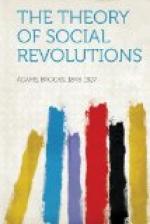had good in him to have been loved as he was throughout
life. He was besides more intelligent touching
the Revolution and its meaning than any man approaching
him in rank in France. The Duke, when a young
man, served with credit in the navy, but after the
battle of Ushant, in 1778, where he commanded the
blue squadron, he was received with such enthusiasm
in Paris, that Marie-Antoinette obtained his dismissal
from the service. From this period he withdrew
from court and his opposition to the government began.
He adopted republican ideas, which he drew from America,
and he educated his children as democrats. In
1789 he was elected to the States-General, where he
supported the fusion of the orders, and attained to
a popularity which, on one occasion, according to Madame
de Campan, nearly made the Queen faint from rage and
grief. It was from the garden of his palace of
the Palais Royal that the column marched on July 14,
wearing his colors, the red, white and blue, to storm
the Bastille. It seemed that he had only to go
on resolutely to thrust the King aside and become
the ruler of France. He made no effort to do so.
Mirabeau is said to have been disgusted with his lack
of ambition. He was charitable also, and spent
very large sums of money among the poor of Paris during
the years of distress which followed upon the social
disorders. The breach with the court, however,
became steadily wider, and finally he adhered to the
party of Danton and voted for the condemnation of the
King. He sent two of his sons to serve in the
army. The elder was still with Dumouriez at the
time of his treason. On April 6, 1793, when Dumouriez’s
treachery had become known, the Assembly ordered the
arrest of the whole Bourbon family, and among them
the Duke was apprehended and sent to Marseilles.
Thus it appears that whatever complaint his own order
may have had against Egalite, the Republic certainly
had none. No man could have done more for modern
France than he. He abandoned his class, renounced
his name, gave his money, sent his sons to the war,
and voted for his own relative’s death.
No one feared him, and yet Robespierre had him brought
to Paris and guillotined. His trial was a form.
Fouquier admitted that he had been condemned before
he left Marseilles. The Duke was, however, very
rich and the government needed his money. Every
one understood the situation. He was told of
the order for his arrest one night when at supper
in his palace in Paris with his friend Monsieur de
Monville. The Duke, much moved, asked Monville
if it were not horrible, after all the sacrifices
he had made and all that he had done. “Yes,
horrible,” said Monville, coolly, “but
what would you have? They have taken from your
Highness all they could get, you can be of no further
use to them. Therefore, they will do to you,
what I do with this lemon” (he was squeezing
a lemon on a sole); “now I have all the juice.”
And he threw the lemon into the fireplace. But
yet even then Robespierre was not satisfied.
He harbored malice against this fallen man. On
the way to the scaffold he ordered the cart, in which
the Duke sat, to stop before the Palais Royal, which
had been confiscated, in order that the Duke might
contemplate his last sacrifice for his country.
The Duke showed neither fear nor emotion.




